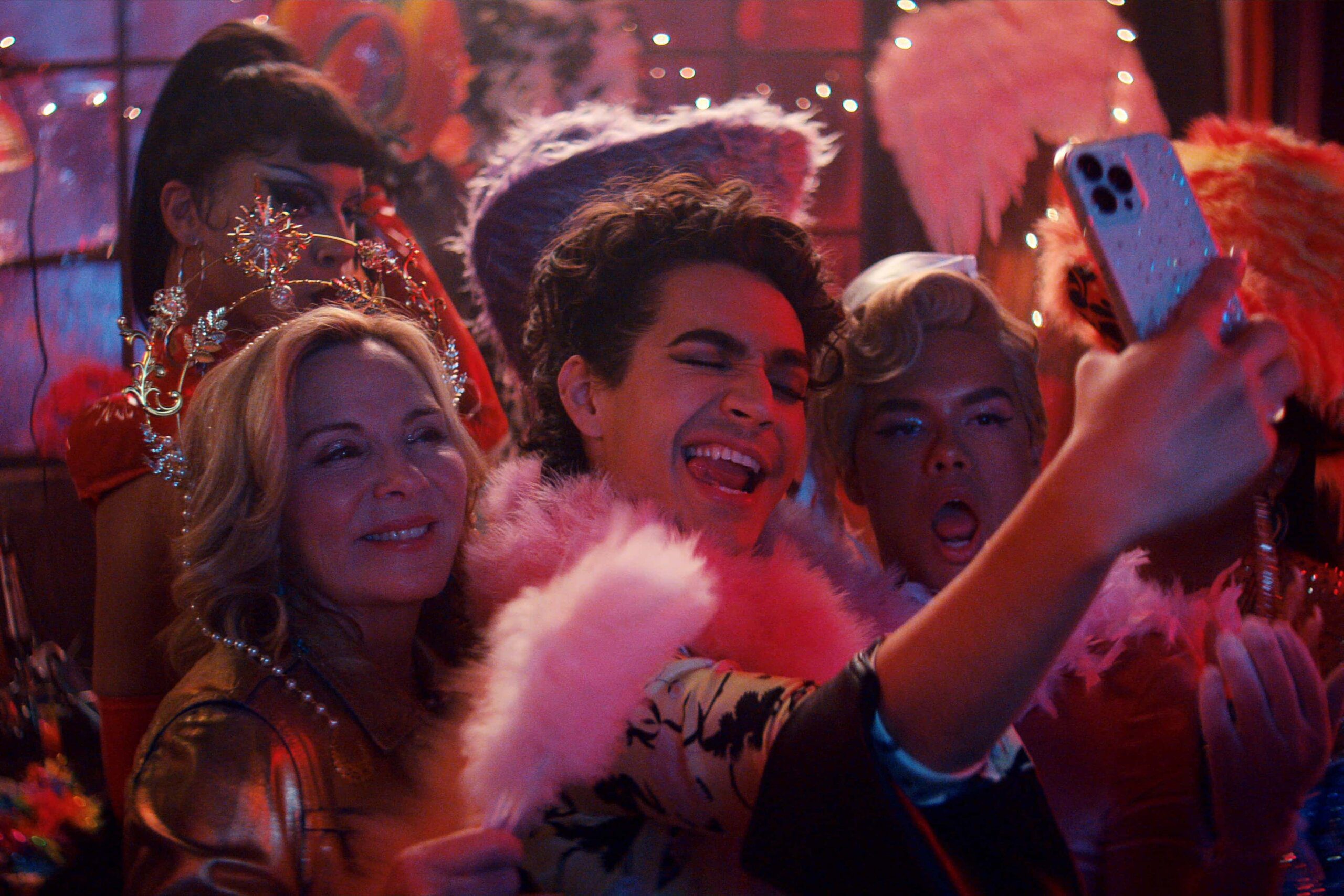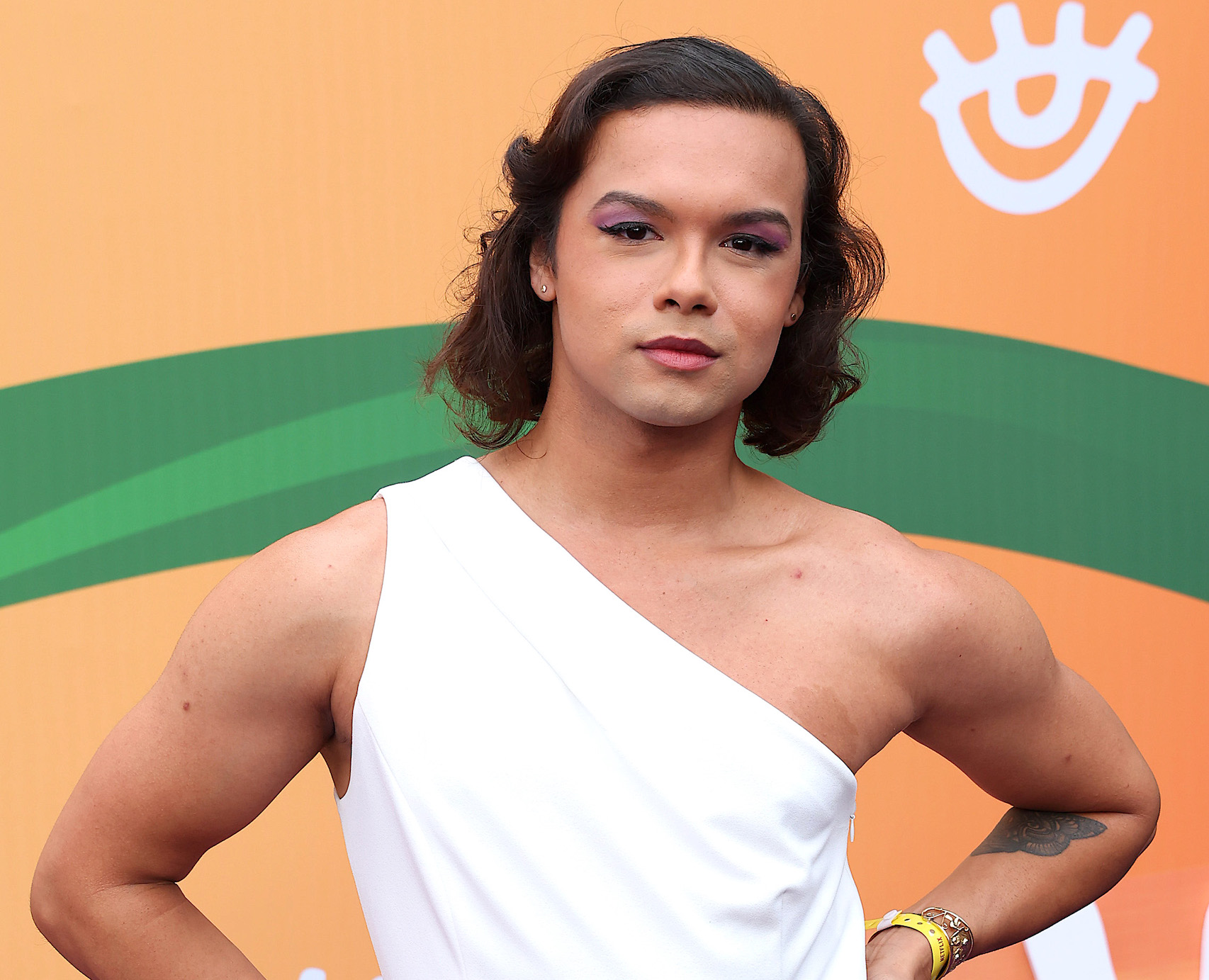Damian Terriquez doesn’t understand Canadian milk. The Mexican-American actor was in the early stages of shooting their upcoming Netflix comedy series Glamorous in Toronto when he decided to stop by a grocery store near their hotel one day. After searching for a milk carton to no avail, a store employee pointed him to a stack of five-litre bags.
“It was, like, a bladder of milk,” they tell Xtra over a Zoom interview. “Somebody had sent me flowers, so I dumped that out. I put the milk in a vase and that was my dirty little secret filming in Toronto—I was pouring milk from a ‘pitcher’ of flowers.”
Terriquez has no shortage of funny stories from the set of Glamorous, which is set for release on June 22. Starring a diverse cast led by YouTube alum Miss Benny and sitcom royalty Kim Cattrall, Glamorous revolves around Marco Mejia (Benny), an aspiring makeup influencer who lands a job working for renowned makeup mogul Madolyn Addison (Cattrall). Terriquez—who previously appeared in series like Max’s The Sex Lives of College Girls, OWN’s All Rise and Netflix’s That ’90 Show—plays Dizmal Failure, a drag queen and fixture of the Bushwick club scene who, for a cautiously optimistic Marco, serves as a guide into Brooklyn’s nightlife.
With an extensive background in dance (Terriquez has appeared in music videos for Halsey, Tiesto and Dillon Francis), as well as fashion (they founded the gender-neutral clothing company Epicone in 2020), Terriquez is ready to make a splash on the small screen. Radiating humour, confidence and infectious enthusiasm, it’s easy to see why they were cast as this larger than life character, whose flair is perhaps the perfect embodiment of the show’s glitzy title.

Kim Cattrall, Miss Benny and Damian Terriquez in a scene from “Glamorous.” Credit: Courtesy of Netflix
In the days leading up to the premiere of Glamorous, Xtra sat down with Terriquez to discuss the project, their budding career and what it’s like to be a non-binary actor in a binaristic culture.
I know Glamorous is about the beauty industry, but some viewers may not know that you actually have a background in fashion. Were you able to bring any of that experience to set with you?
Most of the brands and the stuff that I’m familiar with are high fashion and runway stuff, and that was not my character’s budget because they’re a club kid. They would not have Bottega Veneta clothing, but we were still able to pull some really beautiful stuff that just happens to be on a budget.
What drew you to the role of Dizmal?
It was just such a fun character. It’s ironic that the character’s name is Dizmal Failure, because they have so much fun and light and effervescence. The main growth for the protagonist is this journey of self discovery, and figuring out who they are. That’s really the theme of the show: growing up. Like when you’re at your first job and you want to move up and you feel like you deserve that. Or when you’re leaving home for the first time and getting your first adult job. So there’s all of those themes, but Dizmal is off to the side doing their own thing. It’s so much fun to get to explore a character who happens to be super diverse and super queer—and not necessarily rich or famous or glamorous—who is so secure in themselves that they’re actually able to help other people and facilitate their own journeys. Dizmal doesn’t have everything figured out, but I think they do have themselves figured out.
As an ensemble comedy, Glamorous sports a huge cast, including Kim Cattrall who most people will likely recognize as Samantha Jones from Sex and the City, and Miss Benny who got their start on YouTube. Were you ever starstruck on set?
I mean, Kim. Like, hello? Yeah, it was so much fun. Like you said, it’s an ensemble, so as an actor, just in general, that kind of eases the pressure of having to carry a whole show. I mean, Benny very much is the protagonist, and it’s very much their show.
But girl, when I met Kim, it was crazy. I was really in my head about it because she’s also a producer on the show. I think I was wearing a blonde wig at the time, and she came up to me and she was like, “Hi, I’m Kim Cattrall.” And I was like, “I know. I’m—yes, I’m familiar.” [Chuckles] She was super great. We spent all day together and we had to enter from the same side. So before they called to action, and after they called “Cut,” we basically went to the same spot and she was like, “So how’s your day going?” It was just small banter, and then we started talking about Tom Ford (because she was wearing Tom Ford) and New York, and a bunch of other stuff. I was like, “I’m talking to Samantha right now. Okay.”
Was she anything like Samantha?
I mean, that was so long ago, too. Kim is very much an actress—she loves theatre. That’s what we were talking about most, because she did a Noël Coward play called Private Lives that my fiancé got to see in New York. And I was like, “Don’t bring up Sex and the City. Don’t bring up Sex and the City.” I think she was appreciative of the fact that I know her from a few other things.
I know that the show itself has had quite a journey, being handled initially by CW before the pilot got shelved and it was picked up by Netflix. What did that journey look like for you?
Well, I was very late in that process—as far as I know, I was the last person cast. I was on vacation in London when I got the audition—I was on a cruise. That was a whole nightmare, just to send [recordings] back and forth with the time differences.
When you get cast that late, there’s so much information already out on the show. So when I got the audition I was looking it up and I was like, okay, Charles [Charlene Incarnate] is in this, Benny’s in this, it’s David Niven Jr.’s production company… These are all names that I recognized, so it was a little bit of extra pressure. But I was on vacation so I was relaxed.
Was it nerve-wracking at all, being the last person to get cast?
Oh, yeah! I thought I was gonna get fired every day. [Laughs] Not even from anything bad… No one said anything but in my head it’s like, “Last one in, first one out.”
I was used to production—that was my day job, I worked on shows as a coordinator—so I was used to getting a bunch of information. You get the daily call sheets and the call sheets for the next day super early. As an actor, you don’t get a lot of information, it’s just the stuff pertaining to you. I would check my Instagram because the producers follow me, and I was like, “They still follow me so I don’t think they’re gonna fire me.”
There’s arguably more LGBTQ2S+-focused media now than ever before. This has led to debates about the difference between content that’s made about queer people and content that’s actually made for queer people. Where does Glamorous fit into this conversation?
I think—and not just because I’m on it—that it does a really great job of catering to both. By that, I don’t mean doing either one halfway. The show is about many different letters in the LGBTQIA+ community, but what I really appreciated is that it’s about these people, but it’s not about the diversity. It just happens to be an office in New York, and that’s what you would expect this office to look like. It’s a beauty company, so you’d think there’s gonna be some LGBT representation there. There’s definitely journeys of self discovery, but it’s not a coming out story. It’s about being an adult and the freedom to constantly be discovering yourself or rediscovering yourself.
I’m not the only non-binary character. I’m not the only Hispanic character. There’s not only one Black or white character, Asian character. Because there were so many of us, it was a little easier to not feel like one person was shouldering the entire community. Benny’s character is non-conforming, but mine is non-binary, so neither of us were like, “I have to be everything for any genderqueer person.” Also, there was some sort of representation all the way up the food chain, even internally. Some of our producers were queer, our writers were queer. The casting executives at Netflix I’m familiar with, and one of them is gay, and someone at CBS and then the marketing team at Netflix… I felt really taken care of in terms of they know what we’re trying to do.
At the same time, I’m really grateful that it’s not just a show that’s full of references. Sometimes I think it might be a little intimidating for a cis, straight, white person to watch the show and be, “Oh, well, that’s not for me.” But I think [the show] does a great job of introducing people to certain concepts and not making a meal out of things. We have the pronoun conversation on the show, and it’s very much like, “This is Marco (he/him), this is Dizmal, (they/them),” and we move on, so there’s not really enough time for a layperson or someone who’s on the fence to fight back… I don’t think it’s intimidating in that way for someone who might not know the community. There’s definitely still references for the girls, but I think it’s a good [mix] of both. In that sense, I’m really excited. With everything going on right now, you do need something that just portrays people as people. The rest is up to the audience.
Can you speak to the significance of a show starring a lead that isn’t traditionally masculine and featuring an ensemble full of gender non-conforming individuals?
Having studied fashion especially, I just never understood why men had to shop in “this” section and women had to shop “over there.” And the men’s clothes were, like, button-ups and trousers, and girls got blouses and this and that, and it was just so much more expressive. Part of my dissertation when I was graduating was the gender neutral space. Two years ago, “gender neutral” was just jeans, a hoodie and a T-shirt. Yeah, of course that’s not binary—but it’s also boring.
With the show, it was just so much fun to see Benny in an office in heels and a cute little blazer—because that’s how I used to go to work. Again, for a layperson to hear “non-binary” or “gender non-conforming” [in relation to fashion] or any of those newer words (they’re not new, but they’re newer terms to the general conversation), I don’t think they get what it means. Maybe it’s just a romper that technically looks masculine but it’s a woman’s cut, you know? Or wearing a little pump, or a nice little boot that has a heel on it. It’s not this dismantling of social structures and hierarchy. It’s just clothes. It’s just an introduction. We don’t have a mainstream character like that.
With Dizmal, part of it is costume because it’s for the theatrics of the club—but also, it just looks really pretty. So if somebody gets to watch the show, and just be like, “Oh, maybe I’ll try that blouse, or maybe I’ll get that shoe that has a slightly higher heel that I’ve never tried,” I think that’s important…allowing themselves to actually explore the things that interest them. Because it’s nobody else’s life indoors, you know?
In this current sociopolitical climate of drag bans, “grooming” rhetoric, and all of this reactionary—for lack of a better word—bullshit, why is representation important to you? And how is the show helping in that sphere?
Well, I think it’s important because we exist. [Laughs] It’s as simple as that. But also, my family’s from rural Mexico. My fiancé’s family is from the South. I do give a lot of grace to people who don’t know what they don’t know.
I’m hoping that somebody who doesn’t watch Drag Race because it’s “too much,” maybe watches this show for Kim and then gets exposed to this other avenue of life. That it introduces them to life as a queer person who’s just normal. It’s just normal. We’re just people.
What’s one thing you think audiences should know about Glamorous before tuning in?
The premise I was told—which is part of what really got me going—was “It’s Ugly Betty meets The Devil Wears Prada, with a bunch of queer people.”
Interview has been edited for length and clarity.


 Why you can trust Xtra
Why you can trust Xtra


